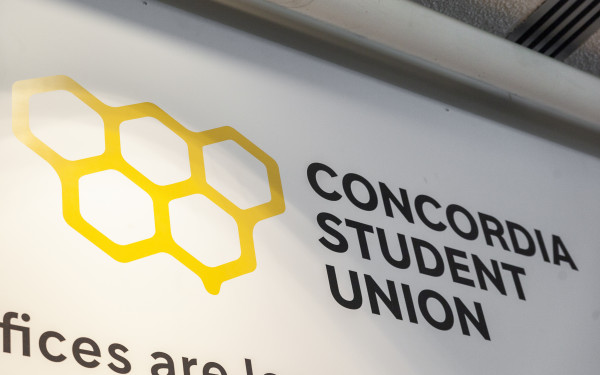CSU By-elections: What You’ll Be Voting For
The CSU by-elections take place from Nov. 24 to 26. Here is a breakdown of the referendum questions that will appear on the ballot.
Accessible Education
“Do you as a member of the Concordia Student Union (CSU) agree to adopt an accessible education position for the union positions book, as outlined below?”
The question asks students to give “support for high quality, universally accessible postsecondary education as a human right,” and oppose “any increase in tuition fees and obligatory institutional fees for all students, whether Quebec resident, out of province, or International.”
Since 2012, the CSU has been opposing the tuition hike proposed by the Quebec government, while advocating for a tuition freeze. In the past three years, tuition fees for all students in Quebec have been raised. However, the tuition hikes have been more significant for out-of-province students and international students.
The position is in response to the deregulation of tuition fees for international students in six different programs in Quebec, according to CSU president Terry Wilkings.
“What we’re seeing is a historic change in the way that Quebec is charging tuition to international students, where they’re becoming completely deregulated,” he said.
In 2008, the Quebec government deregulated tuition fees for six programs. Deregulation means that all supplementary fees paid by international students would go to the schools and not the province. Therefore the government would not be able to subsidize international students in the deregulated programs, and as a result, the tuition rates have to be raised.
“[The tuition hikes] can be seen or interpreted as a pilot project to further deregulate post-secondary education in Quebec and we feel that it’s important to take an emphatic position against that deregulation,” Wilkings added.
CSU Daycare and Nursery
“Do you as a member of the Concordia Student Union (CSU) agree to create a Daycare and Nursery service for student parents through the re-allocation of the Union’s membership fees as follows effective Fall 2016?”
The idea for CSU’s daycare project began in 2011, after a university study revealed that 81 per cent of undergraduate student parents felt that family obligations were either major or minor obstacles to academic achievement.
A CSU referendum in the 2014 by-elections also indicated that 87 per cent of undergraduate students supported the initiative.
The daycare will have space for 52 children, and will be able to serve up to 70 families, according to Marion Miller, VP of Academic and Advocacy at the CSU and the head coordinator of the project.
This referendum question is meant to balance the CSU’s daycare budget. Revenue for the center is projected at $441,438, with $605,766 in expenses. This would leave a $164,328 budgetary deficit—a major barrier for the project.
The referendum, if passed, would see a fee-levy reallocation of $0.24 from the Student Space, Accessible Education and Legal Contingency (SSAELC) Fund to a Daycare-specific fund. The SSAELC fee-levy will then see a change from $1.00 to $0.76, and the new daycare fund will be $0.24.
“Student-parents have numerous barriers that add difficulty to achieving academic success, and the CSU has a mandate to support students as much as we can—especially those who are marginalized within the community,” said Terry Wilkings, president of the CSU.
If passed, he says the daycare project will be rendered financially sustainable.
Community University Research Exchange (CURE)
“Do you agree to pay 8 cents per credit to the Community-University Research Exchange (CURE Concordia), for the creation of a new Fee-levy group effective Winter 2016?”
CURE provides the opportunity for students from all faculties to work with grassroots non-profit organizations.
When signing up for a project through CURE, students will be able to step outside the classroom environment and collaborate on innovative projects with local communities.
“The skills and knowledge that students learn at the university have the capacity to do so much good out in the community,” said Cassie Smith, CURE coordinator. “CURE is the opportunity to use those skills and make those connections.”
Until now, CURE has been a project of another fee-levy group, the Quebec Public Interest Research Group at Concordia (better known as QPIRG), a resource centre for students and community research that strives to raise awareness and support for grassroots activism around social and environmental justice issues.
As of October this year, CURE has been a separately incorporated non-profit within QPIRG, but they’re looking to branch out completely from the organization in order to have more mobility and funding, according to Smith.
With the fee-levy money raised each semester, CURE hopes to expand its community project database. There are about 50 projects now and Smith says the group wants to offer more opportunities for students in the near future. CURE also wants to host more workshop events, conferences and round tables with faculty and students to brainstorm creative ways to integrate community-based initiatives at Concordia.
Association for the Voice of Education in Quebec (AVEQ)
“Do you as a member of the Concordia Student Union (CSU) agree to affiliate with the Association for the Voice of Education in Quebec (AVEQ), a province-wide student association that represents, mobilizes, and conducts research to advance the pedagogical, political, social, and economic interests of the university student population in Quebec, and pay $3.50 per semester indexed to inflation in accordance with the Consumer Price Index, effective Winter 2016?”
Mobilizing against austerity measures and protecting the environment are two of AVEQ’s main concerns, according to Gabriel Velasco CSU VP External. Roughly 33 per cent of the collected fee-levy will go toward student initiatives like research, mobilization, lobbying, committee budgets and creating a student-run journal.
The student movement in Quebec tends to be dominated by white francophone males, Velasco said. He added that AVEQ will promote racial and gender parity within its executive team, as well as bilingualism.
AVEQ aims to be a more relevant provincial representative for students than the soon-to-be-dissolved Fédération Étudiante Universitaire du Québec, CSU President Terry Wilkings said.
“Our students don’t really know what FEUQ is,” Wilkings added.
Last month, the CSU council passed a motion to assist in FEUQ’s official dissolution, as it currently isn’t collecting a fee-levy from its members since becoming inactive last semester. A coalition of student leaders split to begin forming two new organizations—AVEQ and the Union étudiante du Québec (or UEQ).
The executive team, which has six coordinators, will accumulate 21 per cent of the total money collected from its membership. This will go towards paying “minimum wage” for 40-hour weeks, according to AVEQ’s website. Twenty-two per cent of the collected fee-levy will go to a staff of five people to make a “living wage.” The five staff positions are executive advisor, accounting technician, office technician, translator and graphic designer.
The $3.50 fee per semester will be tied to the Canadian Consumer Price Index. FEUQ partly failed because of a lack in funding and an inability to raise its fee-levy, Wilkings said. Having the fee-levy tied to inflation will act as a safeguard to prevent any future crisis, he believes.
According to Velasco, the other universities that will vote to join AVEQ by the winter semester include the Université du Québec à Chicoutimi, Université du Québec à Rimouski, Université du Québec à Trois-Rivières, McGill and the education faculty at UQAM, among others.
In comparison:
FEUQ: 10-person executive team, four staff members, $2.50 fee-levy
Association pour une solidarité syndicale étudiante (ASSÉ), which the CSU left in 2004: seven-person executive team, $1.50 fee-levy
UEQ: 10-person executive team, $4.50 per semester
Social Economy Incubator
“Do you as a member of the Concordia Student Union (CSU) support the CSU employing its resources, including a portion of the Student Space, Accessible Education, and Legal Contingency Fund, to establish an autonomous Concordia-based solidarity economy incubator that will primarily engage students through the support, development, study, and promotion of democratic enterprises?”
“Incubation,” in its entrepreneurial context, describes a process of nurturing and supporting a business. The CSU wants to know whether students conceptually support the idea of money going to “democratic enterprises” on campus.
An example of this type of enterprise would be the Hive Cafe Solidarity Co-op: a bottom-up business model.
“[The question] is asking if students would permit using money from the [student space fund] for the purposes outlined in this question,” Benjamin Prunty, former CSU President and current councillor explained. “If the money were to be used for purposes other than those expressed directly in the bylaws that govern this fund, it would have to go to referendum again with an explicit amount and with an explicit purpose.”
In essence, students still have full control over delegation of expenses, whether this question passes or not.
Prunty explained that there are representatives from various businesses and organizations on campus working on a proposal related to this question, which would be put forward at a later date.
Delegates from The Hive, Burritoville, Concordia Food Coalition and HOJO are involved in this proposal. If this referendum question passes, Prunty said they would return with a proposal “to see if students are in favour of materializing a project that has to do with incubation.”
“This isn’t opening any kind of Pandora’s box of possibility, it’s really just asking students if they support further exploration in this direction,” Prunty said.
Bylaw Changes
“Do you as a member of the Concordia Student Union (CSU) approve the proposed by-law changes as presented in the supporting documentation at the ballot station?”
If students vote yes to this question, then the CSU will no longer have a president or vice-presidents.
Instead, the union’s eight-person executive team will be officially titled as “coordinators.” President Terry Wilkings will become the “general coordinator,” the VP Finance becomes Finance Coordinator, and so on.
“It may assist in removing the ego aspect of the executives,” Wilkings said. “In the past, sometimes it could get to your head.”
With the changes in title come slight changes in responsibilities. For example, the Academic and Advocacy Coordinator will be responsible for overseeing the Off-campus Housing and Job Bank, while the sustainability coordinator will act as the liaison within all sustainability groups at Concordia.
Wilkings says changes like these reflect the type of work the executives have already been doing, and having the duties mandated will provide a better blueprint for future teams.
If this question passes, the positions book normally found within the CSU standing regulations will be implemented into the bylaws. Wilkings says this is part of their goal to have more institutional memory from year to year. He believes standing regulations are more for day-to-day operations.
Council can modify standing regulations, but bylaws can only be changed through a vote by membership in a referendum question, he adds.
Another major change is that members can call for an “information general meeting” with a petition signed by 250 members. The petition must detail exactly what information is requested. The meeting has to be held within 30 days of receiving the petition.


_600_832_s.png)


_copy_600_375_90_s_c1.jpg)
_600_375_90_s_c1.JPG)
_600_375_90_s_c1.JPG)